新概念二第1课课文及答案
新概念英语第二册第一课课文讲解
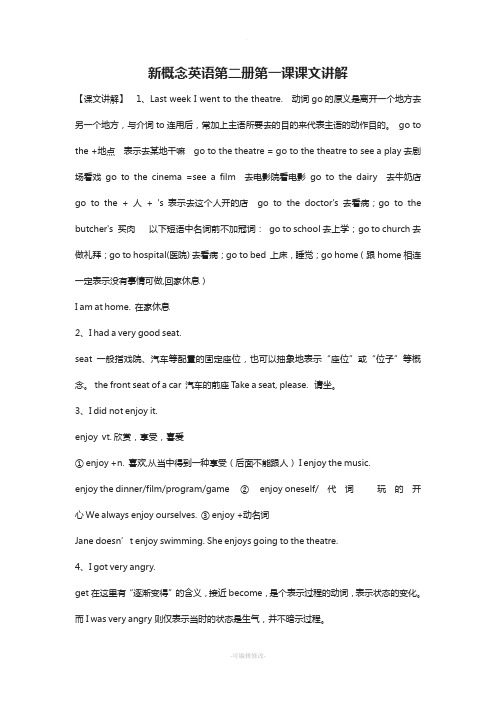
新概念英语第二册第一课课文讲解【课文讲解】1、Last week I went to the theatre. 动词go的原义是离开一个地方去另一个地方,与介词to连用后,常加上主语所要去的目的来代表主语的动作目的。
go to the +地点表示去某地干嘛go to the theatre = go to the theatre to see a play去剧场看戏go to the cinema =see a film 去电影院看电影go to the dairy 去牛奶店go to the + 人+ 's 表示去这个人开的店go to the doctor's 去看病;go to the butcher's 买肉以下短语中名词前不加冠词:go to school去上学;go to church去做礼拜;go to hospital(医院)去看病;go to bed上床,睡觉;go home(跟home相连一定表示没有事情可做,回家休息)I am at home.在家休息2、I had a very good seat.seat一般指戏院、汽车等配置的固定座位,也可以抽象地表示“座位”或“位子”等概念。
the front seat of a car汽车的前座T ake a seat,please.请坐。
3、I did not enjoy it.enjoy vt.欣赏,享受,喜爱①enjoy+n.喜欢,从当中得到一种享受(后面不能跟人)I enjoy the music.enjoy the dinner/film/program/game②enjoy oneself/代词玩的开心We always enjoy ourselves.③enjoy+动名词Jane doesn’t enjoy swimming.She enjoys going to the theatre.4、I got very angry.get在这里有“逐渐变得”的含义,接近become,是个表示过程的动词,表示状态的变化。
新概念英语第二册课后练习题答案详解(第1课)
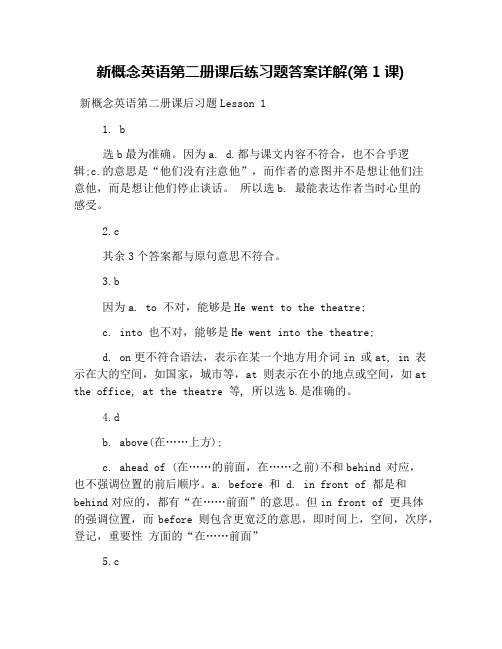
新概念英语第二册课后练习题答案详解(第1课)新概念英语第二册课后习题Lesson 11. b选b最为准确。
因为a. d.都与课文内容不符合,也不合乎逻辑;c.的意思是“他们没有注意他”,而作者的意图并不是想让他们注意他,而是想让他们停止谈话。
所以选b. 最能表达作者当时心里的感受。
2.c其余3个答案都与原句意思不符合。
3.b因为a. to 不对,能够是He went to the theatre;c. into 也不对,能够是He went into the theatre;d. on更不符合语法,表示在某一个地方用介词in 或at, in 表示在大的空间,如国家,城市等,at 则表示在小的地点或空间,如at the office, at the theatre 等, 所以选b.是准确的。
4.db. above(在……上方);c. ahead of (在……的前面,在……之前)不和behind 对应,也不强调位置的前后顺序。
a. before 和 d. in front of 都是和behind对应的,都有“在……前面”的意思。
但in front of 更具体的强调位置,而before 则包含更宽泛的意思,即时间上,空间,次序,登记,重要性方面的“在……前面”5.c因为用 a. Where, b. why, d. when 提问都不符合逻辑,都不是针对状态提问的,只有How提问,才能用Angry回答。
6.ab. they 只做主语;c. their只能做定语;d. us 虽然能够做宾语,但与前一句意思不符合。
7.da. none是代词,很少用在名词前面;b. any 只能用在否定句或疑问句中;c. not any 不符合语法,因为前面没有助动词did.8.ba. chair(椅子), c. armchair(手扶椅) d. class(班级) 这3个选择都和seat的意思不符合。
Seat 是”座位,座席” 的意思。
(完整版)新概念第二册1——10课课文
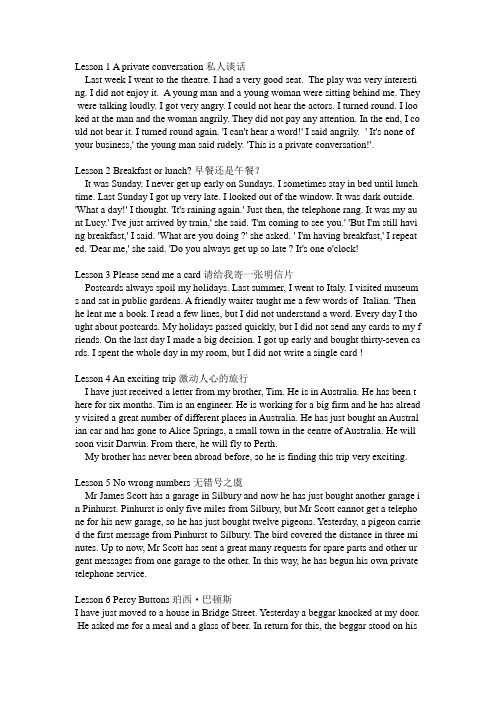
Lesson 1 A private conversation 私人谈话Last week I went to the theatre. I had a very good seat. The play was very interesti ng. I did not enjoy it. A young man and a young woman were sitting behind me. They were talking loudly. I got very angry. I could not hear the actors. I turned round. I loo ked at the man and the woman angrily. They did not pay any attention. In the end, I co uld not bear it. I turned round again. 'I can't hear a word!' I said angrily. ' It's none of your business,' the young man said rudely. 'This is a private conversation!'.Lesson 2 Breakfast or lunch? 早餐还是午餐?It was Sunday. I never get up early on Sundays. I sometimes stay in bed until lunch time. Last Sunday I got up very late. I looked out of the window. It was dark outside. 'What a day!' I thought. 'It's raining again.' Just then, the telephone rang. It was my au nt Lucy.' I've just arrived by train,' she said. 'I'm coming to see you.' 'But I'm still havi ng breakfast,' I said. 'What are you doing ?' she asked. ' I'm having breakfast,' I repeat ed. 'Dear me,' she said. 'Do you always get up so late ? It's one o'clock!Lesson 3 Please send me a card 请给我寄一张明信片Postcards always spoil my holidays. Last summer, I went to Italy. I visited museum s and sat in public gardens. A friendly waiter taught me a few words of Italian. 'Then he lent me a book. I read a few lines, but I did not understand a word. Every day I tho ught about postcards. My holidays passed quickly, but I did not send any cards to my f riends. On the last day I made a big decision. I got up early and bought thirty-seven ca rds. I spent the whole day in my room, but I did not write a single card !Lesson 4 An exciting trip 激动人心的旅行I have just received a letter from my brother, Tim. He is in Australia. He has been t here for six months. Tim is an engineer. He is working for a big firm and he has alread y visited a great number of different places in Australia. He has just bought an Austral ian car and has gone to Alice Springs, a small town in the centre of Australia. He will soon visit Darwin. From there, he will fly to Perth.My brother has never been abroad before, so he is finding this trip very exciting. Lesson 5 No wrong numbers 无错号之虞Mr James Scott has a garage in Silbury and now he has just bought another garage i n Pinhurst. Pinhurst is only five miles from Silbury, but Mr Scott cannot get a telepho ne for his new garage, so he has just bought twelve pigeons. Yesterday, a pigeon carrie d the first message from Pinhurst to Silbury. The bird covered the distance in three mi nutes. Up to now, Mr Scott has sent a great many requests for spare parts and other ur gent messages from one garage to the other. In this way, he has begun his own private telephone service.Lesson 6 Percy Buttons 珀西·巴顿斯I have just moved to a house in Bridge Street. Yesterday a beggar knocked at my door. He asked me for a meal and a glass of beer. In return for this, the beggar stood on hishead and sang songs. I gave him a meal. He ate the food and drank the beer. Then he p ut a piece of cheese in his pocketand went away. Later a neighbour told me about him. Everybody knows him. His nam e is Percy Buttons. He calls at every house in the street once a month and always asks for a meal and a glass of beer.Lesson 7 Too late 为时太晚The plane was late and detectives were waiting at the airport all morning. They were e xpecting a valuable parcel of diamond from South Africa. A few hours earlier, someon e had told the police that thieves would try to steal the diamonds. When the plane arri ved, some of the detectives were waiting inside the main building while others were w aiting on the airfield. Two men took the parcel off the plane and carried it into the Cus toms House. While two detectives were keeping guard at the door, two others opened the parcel. To their surprise, the precious parcel was full of stones and sand! Lesson 8 The best and the worst 最好的和最差的Joe Sanders has the most beautiful garden in our town. Nearly everybody enters for 'T he Nicest Garden Competition' each year, but Joe wins every time. Bill Frith's garden is larger than Joe's. Bill works harder than Joe and grows more flowers and vegetables , but Joe's garden is more interesting. He has made neat paths and has built a wooden bridge over a pool. I like gardens too, but I do not like hard work. Every year I enter f or the garden competition too, and I always win a little prize for the worst garden in th e town!Lesson 9 A cold welcome 冷遇On Wednesday evening, we went to the Town Hall. It was the last day of the year and a large crowd of people had gathered under the Town Hall clock. It would strike twelv e in twenty minutes' time. Fifteen minutes passed and then, at five to twelve, the clock stopped. The big minute hand did not move. We waited and waited, but nothing happ ened. Suddenly someone shouted, 'It's two minutes past twelve! The clock has stoppe d!' I looked at my watch. It was true. The big clock refused to welcome the New Year.At that moment everybody began to laugh and sing.Lesson 10 Not for jazz 不适于演奏爵士乐We have an old musical instrument. It is called a clavichord(翼琴). It was made in Germany in 1681. Our clavichord is kept in the living-room. It has belong to our family for a long time. The instrument was bought by my grandfather many years ago. Recently it was damaged by a visitor. She tried to play jazz on it! She struck the keys too hard and two of the strings were broken. My father was shocked. Now we are not allowed to touch it. It is being repaired by a friend of my father's.。
新概念第二册课后答案详解Lesson1~3

新概念第二册课后答案详解Lesson1~3新概念第二册课后答案详解Lesson11 关键句型练习A I (1) got (2) very angry (3) . I (1) could nothear (2) the actors (3) . I (1) turned round (2) .I (1) looked at (2) the man and the woman (3) angrily (4) .They (1) did not pay (2) any attention (3) . In the end (6), I (1) could not bear (2) it (3). I (1) turned round (2) again (6) . zI (1) can 't hear (2) a word (3)! I(1) said (2) angrily (4) .zIt (1) is (2) none of your business (3) , the young man (1) said (2) rudely (4) . zThis (1) is (2) a private conversation (3)!B 1 I enjoyed the film yesterday.2 I listened to the news carefully.3 The man played the piano well.4 The children played games quietly in their room yesterday.5 He opened the door quietly.6 He left immediately.7 He planted a tree in the corner of the garden.8 He read the letter quickly in his office before lunch.9 I borrowed a book from the library this morning.10 The cook spoilt the soup.11 We stay at home on Sundays.12 There are a lot of people at the bus stop.13 The little boy ate greedily an apple in the kitchen this morning.14 She draws beautifully.15 I like music very much.16 They built a new school in our village last year.17 The match ended at four o ' clock.18 She received a letter from her brother last week.2、选择题1. b选 b 最为正确。
新概念二第1课-课文及答案

新概念二第1课-课文及答案Lesson 1 A private conversation 私人谈话First listen and then answer the question. 听录音,然后回答以下问题。
Why did the writer complain to the people behind him? Last week I went to the theatre. I had a very good seat. The play was very interesting. I did not enjoy it. A young man and a young woman were sitting behind me. They were talking loudly. I got very angry. I could not hear the actors. I turned round. I looked at the man and the woman angrily. They did not pay any attention. In the end, I could not bear it. I turned round again. ‘I can’t hear a word!’ I said angrily.‘It’s none of your business,’ the young man said rudely. ‘This is a private conversation!’New words and expressions 生词和短语Notes on the text 课文注释1 go to the theatre, 去看戏2 got angry, 生气3 turn round, 转身,也可用 turn around。
4 pay attention, 注意。
新概念英语第二册第一课课文及翻译

新概念英语第二册第一课课文及翻译(总1页)-本页仅作为预览文档封面,使用时请删除本页-新概念英语第二册第一课课文及翻译【Text】 Last week I went to the theatre. I had a very good seat. The play was very interesting. I did not enjoy it. A young man and a young woman were sitting behind me. They were talking loudly. I got very angry. I could not hear the actors. I turned round. I looked at the man and the woman angrily. They did not pay any attention. In the end, I could not bear it. I turned round again. "I can't hear a word!" I said angrily. "It's none of your business," the young man said rudely. "This is a private conversation!"参考译文:上星期我去看戏. 我的座位很好, 戏很有意思, 但我却无法欣赏. 一青年男子与一青年女子坐在我的身后, 大声地说着话. 我非常生气, 因为我听不见演员在说什么. 我回过头去怒视着那一男一女, 他们却毫不理会. 最后, 我忍不住了, 又一次回过头去, 生气地说 : “我一个字也听不见了!”“不关你的事, “那男的毫不客气地说, “这是私人间的谈话!”2。
新概念英语课文 第二册1-8课课文及译文
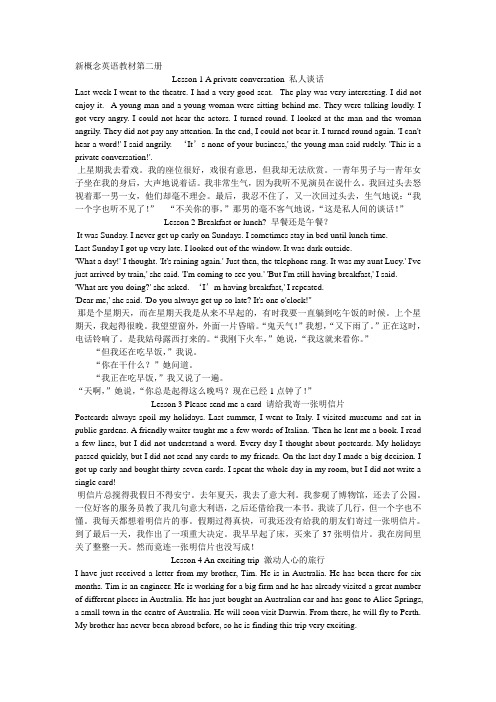
新概念英语教材第二册Lesson 1 A private conversation 私人谈话Last week I went to the theatre. I had a very good seat. The play was very interesting. I did not enjoy it. A young man and a young woman were sitting behind me. They were talking loudly. I got very angry. I could not hear the actors. I turned round. I looked at the man and the woman angrily. They did not pay any attention. In the end, I could not bear it. I turned round again. 'I can't hear a word!' I said angrily. ‘It’s none of your business,' the young man said rudely. 'This is a private conversation!'.上星期我去看戏。
我的座位很好,戏很有意思,但我却无法欣赏。
一青年男子与一青年女子坐在我的身后,大声地说着话。
我非常生气,因为我听不见演员在说什么。
我回过头去怒视着那一男一女,他们却毫不理会。
最后,我忍不住了,又一次回过头去,生气地说:“我一个字也听不见了!”“不关你的事,”那男的毫不客气地说,“这是私人间的谈话!”Lesson 2 Breakfast or lunch? 早餐还是午餐?It was Sunday. I never get up early on Sundays. I sometimes stay in bed until lunch time.Last Sunday I got up very late. I looked out of the window. It was dark outside.'What a day!' I thought. 'It's raining again.' Just then, the telephone rang. It was my aunt Lucy.' I've just arrived by train,' she said. 'I'm coming to see you.' 'But I'm still having breakfast,' I said.'What are you doing?' she asked. ‘I’m having breakfast,' I repeated.'Dear me,' she said. 'Do you always get up so late? It's one o'clock!''那是个星期天,而在星期天我是从来不早起的,有时我要一直躺到吃午饭的时候。
(完整版)新概念英语第二册第一课课文及翻译

新概念英语第二册第一课课文及翻译
【Text】Last week I went to the theatre. I had a very good seat. The play was very interesting. I did not enjoy it. A young man and a young woman were sitting behind me. They were talking loudly. I got very angry.
I could not hear the actors. I turned round. I looked at the man and the woman angrily. They did not pay any attention. In the end, I could not bear it. I turned round again. "I can't hear a word!" I said angrily. "It's none of your business," the young man said rudely. "This is a private conversation!"
参考译文:上星期我去看戏. 我的座位很好, 戏很有意思, 但我却无法欣赏. 一青年男子与一青年女子坐在我的身后, 大声地说着话. 我非常生气, 因为我听不见演员在说什么. 我回过头去怒视着那一男一女, 他们却毫不理会. 最后, 我忍不住了, 又一次回过头去, 生气地说: “我一个字也听不见了!”“不关你的事, “那男的毫不客气地说, “这是私人间的谈话!”。
新概念英语第二册第一课课文及翻译

时间:二O二一年七月二十九日新概念英语第二册第一课课文及翻译之蔡仲巾千创作【Text】 Last week I went to the theatre. I had a very good seat. The play was very interesting. I did not enjoy it. A young man and a young woman were sitting behind me. They were talking loudly. I got very angry. I could not hear the actors. I turned round. I looked at the man and the woman angrily. They did not pay any attention. In the end, I could not bear it. I turned round again. "I can't hear a word!" I said angrily. "It's none of your business," the young man said rudely. "This is a private conversation!"参考译文:上星期我去看戏. 我的座位很好, 戏很有意思, 但我却无法欣赏. 一青年男子与一青年女子坐在我的身后, 年夜声地说着话. 我非常生气, 因为我听不见演员在说什么. 我回过头去怒视着那一男一女, 他们却毫不理会. 最后, 我忍不住了, 又一次回过头去, 生气地说: “我一个字也听不见了!” “不关你的事, “那男的毫不客气地说, “这是私人间的谈话!”时间:二O二一年七月二十九日。
新概念二第1课 课文及答案
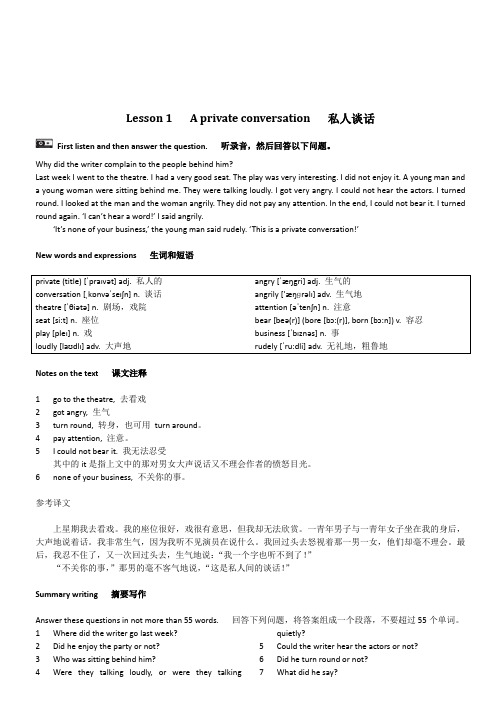
Lesson 1 A private conversation 私人谈话First listen and then answer the question. 听录音,然后回答以下问题。
Why did the writer complain to the people behind him?Last week I went to the theatre. I had a very good seat. The play was very interesting. I did not enjoy it. A young man and a young woman were sitting behind me. They were talking loudly. I got very angry. I could not hear the actors. I turned round. I looked at the man and the woman angrily. They did not pay any attention. In the end, I could not bear it. I turned round again. ‘I can’t hear a word!’ I said angrily.‘It’s none of your business,’ the young man said rudely. ‘This is a private conversation!’New words and expressions 生词和短语Notes on the text 课文注释1 go to the theatre, 去看戏2 got angry, 生气3 turn round, 转身,也可用turn around。
4 pay attention, 注意。
5 I could not bear it. 我无法忍受其中的it是指上文中的那对男女大声说话又不理会作者的愤怒目光。
新概念英语第二册第一课课文详解

【知识点讲解】 ⼀、单词扩展 1.privateadj.私⼈的,个⼈的,私有的 例句:It'smyprivateletter,youcan'treadit. 这是我的信,你不能看。
短语:inprivate秘密地,私下地privatelife私⽣活privateeducation私⼈办学;私⼈教育 说道私⼈教育,就得提到私⽴学校,在国外,有很多privateschool(私⽴学校),⽽国内的学校⼤多是公⽴学校(publicschool)。
2.conversationn.谈话 subjectofconversation话题。
例句:Fashionisalwaysasubjectofconversationamonggirls. 时尚总是⼥孩⼦们热衷的话题。
⼏种"谈话"的区别: talk普通⽤词,可与conversation换⽤,指正式交谈,也可指普通的闲谈。
gossip嚼⾆头,说长道短,也就是我们常说的⼋卦啦。
conversation⼀般⽤于正式⽂体中,指两个或更多⼈互相交换意见的交谈。
dialogue对话,可以指正式国家与国家会谈。
chat闲聊,就跟北京⼈说的“侃”,四川⼈说的“摆龙门阵”,武汉⼈说的“咵天”类似,说的是⽆关紧要的事。
例句:RussiaandJapanarehavingadialogue. 俄罗斯与⽇本正在进⾏会谈。
3.theatren.戏院,剧场,戏剧 知识扩展:cinema电* 例句:Smokingisbannedinthetheatre. 剧院禁⽌吸烟。
4.attentionn.注意 短语:payattention注意 payattentionto对……注意,也可⽤于指男⽣向⼥⽣献殷勤。
另外,to后⾯接动词时必须⽤动词ing结构。
(1)payattentiontosb./sth.注意;专注 (2)payalittleattentiontosb./sth.稍加注意 (3)paymuchattentiontosb./sth.多加注意 (4)paynoattentiontosb./sth.毫不注意……; 5.seat n.座位 这个词是考试中的热点。
新概念英语2_第一课(已修)
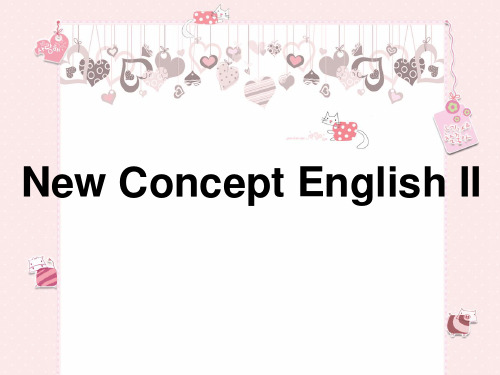
比方说:他大声地说。
主语是他。谓语动词是说。那么他怎样说呢, 大声地说。 这个大声地,是说的方式,我们称之为方式 状语。 那么这个事件还需要个时间和地点了, (where&when)称作地点状语和时间状语。 那么简单陈述句的成分一般包括:主语,谓 语,宾语,方式状语,地点状语和时间状语。 按照这样一个顺序,主谓宾,方式,地点, 时间状语,而在很多情况下时间状语可以放 句首,表强调。
1)bear n. 熊,粗鲁蛮横的 人。 eg. He is really a bear. 2)v. 忍受(stand,put up with sb) eg. I can't bear it anymore. eg. I can't bear the bear.
八。bear
九。business
private
rudely
theatre
bear
angrily
seat
angry
私人的
容忍 注意
无礼的
座位
戏
事
angry business
bear
rudely
play theatre conversation loudly
attentio
private
一。private 1)pivate. adj.作形容词,表“私人的”,通常作定语来修饰 名词。它就相当于personal. 好,看到我们的标题是:A Private Conversation,表示私人 谈话。 a private life a private car a private letter a private school That's for your private ear. 2)表秘密的(secret) a private/secret place 好,现在我们来回顾一下 private 从1)至2)
新概念英语第二册lesson1-lesson5最全课后答案详解。

新概念英语第二册lesson1-lesson5最全课后答案详解。
(呕心沥血之作)Lesson1摘要写作参考答案(Key to Summary writing) Unit 1Lesson 1 A Private ConversationThe writer went to the theatre last week.He did't enjoy the play.A young man and a young woman were sitting behind him.They were talking loudly.The writer couldn't hear the actors.He turned round.He said he couldn't hear a word.The young man said ,'This is a private conversation!'.(53 words)关键句型练习B1 I enjoyed the film yesterday2 I listened to the news carefully.3 The man played the piano well.4 The children played games quietly in their room yesterday.5 He opened the door quietly.6 He left immediately.7He planted a tree in the corner of the garden.8He read the letter quickly in his office before lunch9 I borrowed a book from the library this morning.10the cook spoilt the soup.11 We stay at home on Sundays.12 There are a lot of people at the bus stop.13 The little boy ate greedily an apple in the kitchen this morning.14 She draws beautifully.15 I like music very much.16 They built a new school in our village last year.17 The match ended at four o'clock.18 She received a letter from her brother last week.多项选择题1. b选b最为正确。
新概念英语第二册第一课课文及翻译
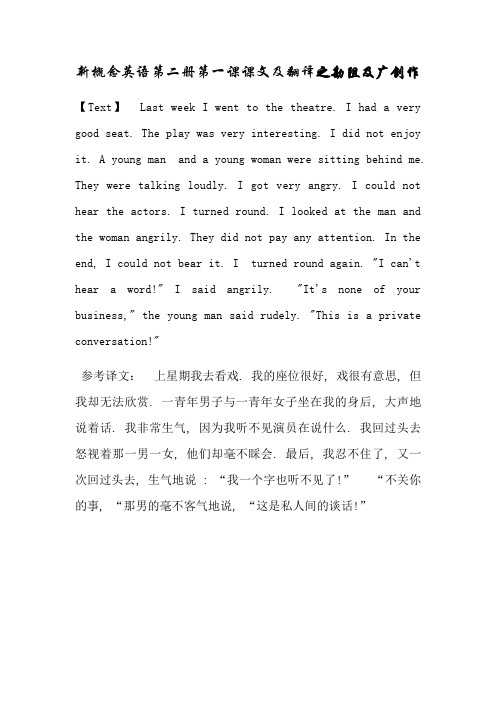
新概念英语第二册第一课课文及翻译之勘阻及广创作【Text】 Last week I went to the theatre. I had a very good seat. The play was very interesting. I did not enjoy it. A young man and a young woman were sitting behind me. They were talking loudly. I got very angry. I could not hear the actors. I turned round. I looked at the man and the woman angrily. They did not pay any attention. In the end, I could not bear it. I turned round again. "I can't hear a word!" I said angrily. "It's none of your business," the young man said rudely. "This is a private conversation!"
参考译文:上星期我去看戏. 我的座位很好, 戏很有意思, 但我却无法欣赏. 一青年男子与一青年女子坐在我的身后, 大声地说着话. 我非常生气, 因为我听不见演员在说什么. 我回过头去怒视着那一男一女, 他们却毫不睬会. 最后, 我忍不住了, 又一次回过头去, 生气地说: “我一个字也听不见了!” “不关你的事, “那男的毫不客气地说, “这是私人间的谈话!”。
新概念英语第二册课后练习答案lesson1

新概念英语第二册课后习题答案详解Lesson 1练习答案Key to written exercises1 .关键句型练习答案A I (1) got (2) very angry (3) .I (1) could not hear (2) the actors (3) .I (1) turned round (2) .I (1) looked at (2) the man and the woman (3) angrily (4) .They (1) did not pay (2) any attention (3) .In the end (6), I (1) could not bear (2) it (3).I (1) turned round (2) again (6) .‘I (1) can't hear (2) a word (3)! ’I (1) said (2) angrily (4) .‘It (1) is (2) none of your business (3) , ’the young man (1) said (2) rudely (4) .‘This (1) is (2) a private conversation (3)! ’B 1 I enjoyed the film yesterday.2 I listened to the news carefully.3 The man played the piano well.4 The children played games quietly in their room yesterday.5 He opened the door quietly.6 He left immediately.7 He planted a tree in the corner of the garden.8 He read the letter quickly in his office before lunch.9 I borrowed a book from the library this morning.10 The cook spoilt the soup.11 We stay at home on Sundays.12 There are a lot of people at the bus stop.13 The little boy ate greedily an apple in the kitchen this morning.14 She draws beautifully.15 I like music very much.16 They built a new school in our village last year.17 The match ended at four o'clock.18 She received a letter from her brother last week.2 .多项选择题答案1. b 选b 最为正确。
新概念英语第二册课后答案(全部)

•新概念英语第二册课后答案Lesson11.b选b最为正确。
因为a.d.都与课文内容不符合,也不合乎逻辑;c.的意思是“他们没有注意他”,而作者的意图并不是想让他们注意他,而是想让他们停止谈话。
所以选b.最能表达作者当时心里的感受。
2.c其余3个答案都与原句意思不符合。
3.b因为a.to不对,可以是Hewenttothetheatre;c.into也不对,可以是Hewentintothetheatre;d.on更不符合语法,表示在某一个地方用介词in或at,in表示在大的空间,如国家,城市等,at则表示在小的地点或空间,如attheoffice,atthetheatre等,所以选b.是正确的。
4.db.above(在……上方);c.aheadof(在……的前面,在……之前)不和behind对应,也不强调位置的前后顺序。
a.before和d.infrontof都是和behind对应的,都有“在……前面”的意思。
但infrontof更具体的强调位置,而before则包含更宽泛的意思,即时间上,空间,次序,登记,重要性方面的“在……前面”5.c因为用a.Where,b.why,d.when提问都不符合逻辑,都不是针对状态提问的,只有How提问,才能用Angry回答。
6.ab.they只做主语;c.their只能做定语;虽然可以做宾语,但与前一句意思不符合。
7.da.none是代词,很少用在名词前面;b.any只能用在否定句或疑问句中;c.notany不符合语法,因为前面没有助动词did.8.ba.chair(椅子),c.armchair(手扶椅)d.class(班级)这3个选择都和seat的意思不符合。
Seat是”座位,座席”的意思。
强调的是可供坐下的地方,不是具体的椅子。
只有b.place是seat的同义词。
9.ab.big(大的)指体积;c.tall(高的)指身材;rge(大的)指空间和面积。
这3个词都与人的年龄无关。
(完整word版)新概念二第1课 课文及答案

Lesson 1 A private conversation 私人谈话First listen and then answer the question. 听录音,然后回答以下问题。
Why did the writer complain to the people behind him?Last week I went to the theatre. I had a very good seat. The play was very interesting. I did not enjoy it。
A young man and a young woman were sitting behind me. They were talking loudly. I got very angry。
I could not hear the actors。
I turned round。
I looked at the man and the woman angrily。
They did not pay any attention. In the end, I could not bear it。
I turned round again。
‘I can’t hear a word!' I said angrily。
‘It’s none of your business,’the young man said rudely. ‘This is a private conversation!’New words and expressions 生词和短语private (title) [ˈpraɪvət] adj. 私人的angry [ˈæŋgri] adj。
生气的conversation [ˌkɒnvəˈseɪʃn] n。
谈话angrily [’æŋɡrəlɪ] adv. 生气地theatre [ˈθiətə] n. 剧场,戏院attention [əˈtenʃn] n. 注意seat [si:t] n。
- 1、下载文档前请自行甄别文档内容的完整性,平台不提供额外的编辑、内容补充、找答案等附加服务。
- 2、"仅部分预览"的文档,不可在线预览部分如存在完整性等问题,可反馈申请退款(可完整预览的文档不适用该条件!)。
- 3、如文档侵犯您的权益,请联系客服反馈,我们会尽快为您处理(人工客服工作时间:9:00-18:30)。
Lesson 1 A private conversation 私人谈话First listen and then answer the question. 听录音,然后回答以下问题。
Why did the writer complain to the people behind himLast week I went to the theatre. I had a very good seat. The play was very interesting. I did not enjoy it. A young man and a young woman were sitting behind me. They were talking loudly. I got very angry. I could not hear the actors. I turned round. I looked at the man and the woman angrily. They did not pay any attention. In the end, I could not bear it. I turned round again. ‘I can’t hear a word!’ I said angrily.‘It’s none of your business,’ the young man said rudely. ‘This is a private conversation!’New words and expressions 生词和短语private (title) [pravt] adj. 私人的angry [gri] adj. 生气的conversation [knvsen] n. 谈话angrily ['ɡrl] adv. 生气地theatre [θit] n. 剧场,戏院attention [tenn] n. 注意seat [si:t] n. 座位bear [be(r)] (bore [b:(r)], born [b:n]) v. 容忍play [ple] n. 戏business [bzns] n. 事loudly [ladl] adv. 大声地rudely [ru:dli] adv. 无礼地,粗鲁地Notes on the text 课文注释1 go to the theatre, 去看戏2 got angry, 生气3 turn round, 转身,也可用turn around。
4 pay attention, 注意。
5 I could not bear it. 我无法忍受其中的it是指上文中的那对男女大声说话又不理会作者的愤怒目光。
6 none of your business, 不关你的事。
参考译文上星期我去看戏。
我的座位很好,戏很有意思,但我却无法欣赏。
一青年男子与一青年女子坐在我的身后,大声地说着话。
我非常生气,因为我听不见演员在说什么。
我回过头去怒视着那一男一女,他们却毫不理会。
最后,我忍不住了,又一次回过头去,生气地说:“我一个字也听不到了!”“不关你的事,”那男的毫不客气地说,“这是私人间的谈话!”Summary writing 摘要写作Answer these questions in not more than 55 words. 回答下列问题,将答案组成一个段落,不要超过55个单词。
1 Where did the writer go last week2 Did he enjoy the party or not3 Who was sitting behind him4 Were they talking loudly, or were they talkingquietly 5 Could the writer hear the actors or not6 Did he turn round or not7 What did he say8 Did the young man say, ‘The play is not interesting,’or did he say, ‘This is a private conversation!’摘要写作参考:The writer went to the theatre last week. He did not enjoy the party. A young man and a young woman were sittingbehind him. They were talking loudly. The writer could not hear the actors. He turned round. ‘I can’t hear a word!’ He said. ‘This is a private conversation!’ the young man said.(55 words)Key structures 关键句型Word order in simple statements 简单陈述句的语序a A statement tells us about something. All the sentences in the passage are statements. Each of these statementscontains one idea. Each statement tells us about one thing. A statement that tells us about one thing is a simple statement.陈述句用来叙述一件事情。
本段课文中的所有句子都是陈述句。
每个句子包含着一个概念,告诉我们一件事情。
凡是叙述一件事情的陈述句都是简单陈述句。
b The order of the words in a statement is very important. Look at these two statements. They both contain the wordsbut they do not mean the same thing:陈述句的语序很重要,注意下面两个句子,每句话所用的单词相同,但句子所表达的意思不同:The policeman arrested the thief. 警察逮捕了小偷。
The thief arrested the policeman. 小偷逮捕了警察。
c A simple statement can have six parts, but it does not always have so many. Study the order of the words in thefollowing columns. Note that column 6 (When) can be at the beginning or at the end of a statement.一个简单陈述句可以由6部分组成,但是并不是每个句子都有这么多组成部分。
注意下表中句子的语序。
第6栏(表示时间)可以放在句首或句尾。
Exercises 练习A Rule seven columns on a double sheet of paper. At the top of each column, write the numbers and the words givenin the Table below. Copy out the rest of the passage. Put the words of each statement in the correct column in the way shown in the Table.在一张大纸上画出7栏,在前两行相应的栏内填入下表中第1、2行的数字和关键词,将课文中其他句子也注释:本课的关键句型是简单陈述句。
陈述句是用来叙述一件事情的句子。
每个句子包含一个概念,告诉我们一件事情。
一个简单陈述句可以由6部分组成,但是并不是每个句子都有那么多部分。
这6部分的顺序应该是:主语/动词/宾语或补语/方式状语/地点状语/时间状语(Subject/Verb/Object or Complement/Manner/Place/Time)。
时间状语可以放在句尾,也可以放在句首:The children played games quietly in their room yesterday.主/动/宾/方式/地点/时间Last week I went to the theatre.时间/主/动/地点B Use the seven columns again for this exercise. There is a line under each word or group of words in the statementsbelow. The words are not in the right order. Arrange them correctly in the seven columns. Look at this example:I last year to America went.The correct order is: I (who) went (action) to America (where) last year (when).Or: Last year I went to America.1 The film I enjoyed yesterday.I enjoyed the film yesterday.2 The news listened to I carefully.I listened to the news carefully.3 Well the man the piano played.The man played the piano well.4 Games played yesterday in their room the children quietly.The children played games quietly in their room yesterday.5 Quietly the door he opened.He opened the door quietly.6 Immediately left he.He left immediately.7 A tree in the corner of the garden he planted.He planted a tree in the corner of the garden.8 Before lunch the letter in his office quickly he read.He read the letter quickly in his office before lunch.9 This morning a book I from the library borrowed.I borrowed a book from the library this morning.10 The soup spoilt the cook.The cook spoilt the soup.11 We at home stay on Sunday.We stay at home on Sundays.12 There a lot of people are at the bus stop.There are a lot of people at the bus stop.13 The little boy an apple this morning ate greedily in the kitchen.The little boy ate greedily an apple in the kitchen this morning.14 She beautiful draws.She draws beautiful.15 Music I like very much.I like music very much.16 A new school built they in our village last year.They built a new school in our village last year.17 The match at four o’clock ended.The match ended at four o’clock.18 She a letter from her brother last week received.She received a letter from her brother last week.Multiple choice questions 多项选择题Comprehension 理解1 The writer turned round. He looked at the man and the woman angrily _____.(a) and they stopped talking (b) but they didn’t stop talking(c) but they didn’t notice him (d) but they looked at him rudely解析:选(b)最为正确。
